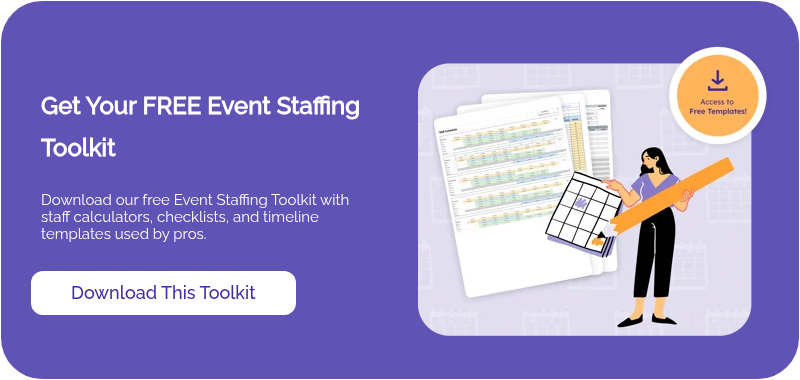With any experiential or marketing event, whether it be a brand activation, tradeshow, or conference, there’s an enormous amount of effort that goes into ensuring a successful event that delivers impact.
After the curtains close on an event, it’s an important time to reflect, take stock, and ensure all that hard work (and budget) doesn’t go to waste. This is where the post-event report becomes an invaluable asset.
In this comprehensive guide to post-event reports, we’ll explore what they are, why they matter, offer tips on writing them, what they should include, and how you can use them to shape the success of future events.
Whether you’re an event organizer, marketer, or stakeholder, understanding the power of post-event reports can significantly improve your event’s success.
Let’s dive in and share how to turn hindsight into foresight.
What is a Post-Event Report and Why Does it Matter?
An essential part of your event strategy, a post-event report is a comprehensive document that summarizes key event metrics such as attendance, budget, and engagement.
More than just a recap, it provides a platform for evaluating the success of the event against its objectives, allowing you to measure your achievements and identify areas for improvement.
A post-event report helps stakeholders evaluate the return on investment (ROI) and serves as a record for future event planning. It ensures lessons are learned and best practices are applied. It’s a strategic tool that provides a clear picture of the event’s impact and informs decisions for future initiatives.
Event Marketing Statistics You Need to Know
If there’s any doubt about the importance of leveraging events as a vital component of your marketing mix, these 2024 statistics from the market research platform, Gitnux, underscore their significance.
- 80% of marketers believe live events are critical to their company’s success
- 61% of marketers use events as their most important marketing tool
- 98% of users feel more inclined to purchase after attending an activation
- Event sponsorship drives brand engagement with 98% of consumers
- 48% of brands realize an ROI of between 300% to 500% with event marketing
- U.S. companies spend an estimated $122 billion on event marketing annually
Be sure to read more statistics that are integral to event planning in 2024 right here.
Tips for Writing and Sharing an Insightful Post-Event Report
While writing a post-event report may not be the most thrilling task on your to-do list, with the right approach and some careful thought ahead of time, you can streamline the process. The tips provided here are designed to ease the burden and make the task of writing the report a little more manageable and break it down into bite-sized steps to help get you started.
- Timeliness: Establish a timeline for completing the post-event report to ensure that it's done in a timely manner. Setting a deadline shortly after the event helps capture details while they're still fresh and relevant.
- Keep notes: Stay organized! Take detailed notes and pictures during the event to remind yourself of any issues or key learnings. Even the most organized event planner may not remember every detail during a busy event, and taking notes in real-time helps capture accurate insights, feedback, and data. This will help create the foundation for a clear and structured report.
- Visuals: While it may sound cliché, the adage "A picture is worth a thousand words!" is undeniably true. Include visuals such as charts, graphs, and photographs to enhance the readability and visual appeal of the post-event report. Visuals can help illustrate data trends, highlight key points, and make information easier to understand and digest.
- Acknowledgments: Be sure to acknowledge and give thanks where necessary to sponsors, vendors, partners, and staff. Recognizing their contributions fosters goodwill and helps strengthen relationships for future events.
- Review and Revise: Thoroughly review the post-event report to eliminate any errors or glaring omissions. Consider gathering feedback from colleagues to gain different perspectives and improve the quality of the report.
- Distribution: Determine the appropriate audience for sharing your report. Who needs to see it? Internal distribution should include relevant team members, departments, and key stakeholders. This promotes transparency and ensures that everyone is aligned on the event's outcomes and insights. External distribution could include staffing agencies, sponsors, vendors, partners, etc.
- Follow-ups and feedback: After your report, follow up with recipients to answer any questions, address concerns, or solicit feedback. Encourage open dialogue and use the opportunity to discuss potential actions or next steps based on the report's findings.
- Archive for Reference: It may sound obvious but be sure to save the post-event report and associated documentation for future reference and use. Keeping a comprehensive record of past events is extremely useful; enabling continuity and year-over-year comparisons and supporting future planning and decision-making.
What to Include in Your Post-Event Report: Our 15-Point Checklist
In the busy world of experiential event planning, it’s easy to forget or overlook crucial details when summarizing what happened in a post-event report.
That's where a checklist comes in handy—a simple tool to ensure nothing slips through the cracks and helps you capture the essence of your event.
While the list below isn't exhaustive, it covers the basic information that you should include in your post-event report. Feel free to customize it to fit your specific event needs.
1. Event Goals and Objectives
Start with a succinct summary of the event. What was its purpose? Why did you organize it? Set the stage by outlining the predefined event goals set during the event planning phase and evaluate the extent to which they were achieved. For experiential events, these goals might be related to attendance, brand awareness and advocacy, revenue generation, educating and informing attendees, or any other key areas of focus.
2. Budget Analysis
Provide an overview of expenses incurred and compare them against the allocated budget across different categories, such as venue rental, marketing and promotion, catering, entertainment, staffing, and miscellaneous expenses. Highlight any variances, explain the reasons behind them, and identify areas for future improvements and cost savings.
3. Attendance Metrics
Consider including a variety of attendance metrics that focus not only on the number of attendees but also capture the quality and level of engagement. Attendee metrics to consider include unique visitors, dwell time (the amount of time that individuals spend engaged or present at a particular location or event indicating their level of interest), attendance by session or activity, engagement metrics, demographics, attendance trends over time, as well as attendee feedback and sentiment.
4. Key Performance Indicators (KPIs)
KPIs are the benchmarks against which you measure performance and determine whether your event achieved its goals. Depending on your objectives, KPIs for the event might include metrics such as social media impressions, engagement levels, leads generated, or customer satisfaction scores. Analyze performance against these metrics to gauge success.
5. Feedback and Surveys
Summarize feedback collected from attendees, sponsors, vendors, and speakers through post-event surveys, interviews, or social media. Surveys offer structured feedback, allowing targeted questions about specific aspects of an event, from logistics to content delivery. Interviews provide a deeper dive, allowing for nuanced conversations that unveil hidden gems of insight. Highlight key themes and sentiments expressed in your report.
6. Program Evaluation
Recap the event’s flow, were there any sessions, workshops, keynotes, and entertainment or activity segments? Include mention of any last-minute changes or unexpected highlights. Assess the effectiveness of the event program, including session topics, speakers, and activities. Based on attendee feedback and engagement levels, identify highlights and areas for improvement.
7. Marketing and Promotion Efforts
Evaluate the success of marketing campaigns and promotional activities in driving attendance and engagement. Assess the success of the different channels used, from email marketing to social media advertising, influencer partnerships, and traditional media outreach, and measure the effectiveness of different channels and messaging strategies.
8. Technology and Innovation
If relevant to your event, include any technology or digital tools used during the event and evaluate their effectiveness. Examples include mobile event management platforms, event apps, live polling systems, staff scheduling tools, and RFID/NIC tracking technology. Share any benefits and insights these tools offer.
9. Logistical Analysis
Review logistical aspects such as venue selection, transportation arrangements, catering, staffing, and technology infrastructure, including A/V setup. Document the nitty-gritty details, highlight any challenges faced, share how they were resolved, and propose solutions for future events.
10. Partnerships and Scholarships
Assess the impact of partnerships and sponsorships on the event's success. Measure sponsors' ROI and evaluate the effectiveness of collaboration efforts.
11. Media Coverage and Publicity
Summarize media coverage received before, during, and after the event. Evaluate the reach and impact of press releases, media partnerships, and social media mentions.
12. Key Wins
Highlight any key wins, notable successes, or achievements resulting from the event. Showcase how the event benefited attendees, sponsors, or the organization as a whole. This could include standout moments, impressive metrics, positive feedback from attendees or stakeholders, or unexpected outcomes that exceeded expectations.
13. Lessons Learned and Recommendations
Reflect on lessons learned from the event and provide actionable recommendations for improvement in future events. Include suggestions for refining event strategies, enhancing attendee experience, and achieving better outcomes.
14. Follow-up Plans
Cover any follow-up plans resulting from the event. This could include nurturing annoying relationships forged with attendees, plans for future events or initiatives stemming from feedback received, or strategies for maintaining momentum generated by the event.
15. Executive Summary
Not everyone will have the time for a deep dive into every detail of your meticulously crafted post-event report. That’s why it’s critical to include an executive summary that packs a punch to ensure your hard work doesn’t go unnoticed - think of it as the highlight reel of your event’s success. At the beginning of the report, provide a concise overview of the most critical findings and recommendations for quick reference.
Post-Event Report Essentials: Final Thoughts
Writing a thorough post-event report is more than just a post-event ritual; it's a strategic imperative. By following the tips outlined in this post, you can leverage the power of post-event reports to drive continuous improvement, enhance stakeholder relationships, and elevate your brand's reputation. Start documenting your events effectively today!
If you’re an experiential or event agency, ready to create truly memorable experiences, try Workstaff for free and discover how our flexible tools can quickly create custom schedules, track hours, book staff and easily communicate with your team.











